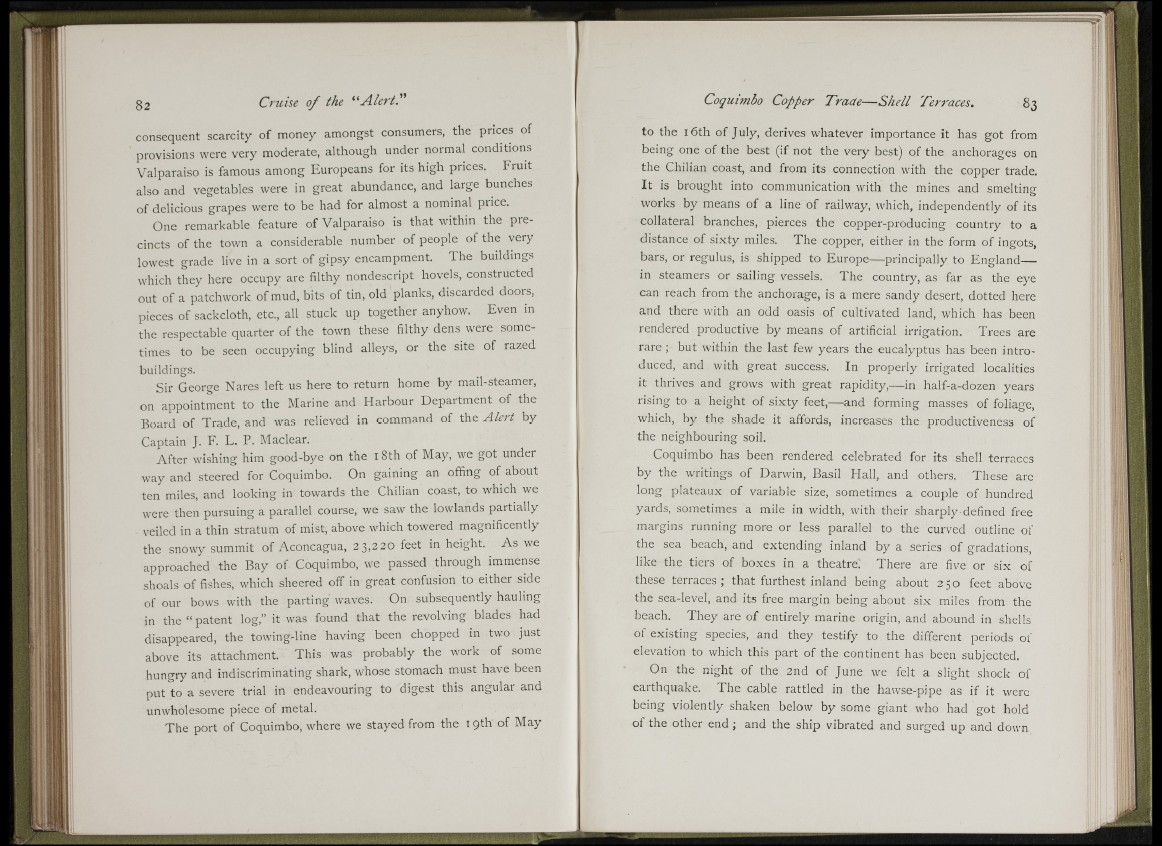
i'
■L¡-
'Á
Coquimbo Copper Trade— Shell Terraces.
consequent scarcity of money amongst consumers, the prices of
provisions were very moderate, although under normal conditions
Valparaiso is famous among Europeans for its high prices. Fiuit
also and vegetables were in great abundance, and large bunches
of delicious grapes were to be had for almost a nominal price.
One remarkable feature of Valparaiso is that within the precincts
of the town a considerable number of people ot the very
lowest grade live in a sort of gipsy encampment. The buildings
which they here occupy are filthy nondescript hovels, constructed
out of a patchwork of mud, bits of tin, old planks, discarded doors,
pieces of sackcloth, etc., all stuck up together anyhow. Even in
the respectable quarter of the town these filthy dens were sometimes
to be seen occupying blind alleys, or the site of razed
buildings.
Sir George Nares left us here to return home by mail-steamer,
on appointment to the Marine and Harbour Department of the
Board of Trade, and was relieved in command of the Alert by
Captain J. F. F. P. Maclear.
After wishing him good-bye on the i8th of May, we got under
way and steered for Coquimbo. On gaining an offing of about
ten miles, and looking in towards the Chilian coast, to which we
were then pursuing a parallel course, we saw the lowlands partially
veiled in a thin stratum of mist, above which towered magnificently
the snowy summit of Aconcagua, 23,220 feet in height. As we
approached the Bay of Coquimbo, we passed through immense
shoals of fishes, which sheered off in great confusion to either side
of our bows with the parting waves. On subsequently hauling
in the “ patent log,” it was found that the revolving blades had
disappeared, the towing-line having been chopped in two just
above its attachment. This was probably the work of some
hungry and indiscriminating shark, whose stomach must have been
put to a severe trial in endeavouring to digest this angular and
unwholesome piece of metal.
The port of Coquimbo, where we stayed from the 19th of May
to the 16th of July, derives whatever importance it has got from
being one of the best (if not the very best) of the anchorages on
the Chilian coast, and from its connection with the copper trade.
It is brought into communication with the mines and smeltinir o
works by means of a line of railway, which, independently of its
collateral branches, pierces the copper-producing country to a
distance of sixty miles. The copper, either in the form of ingots,
bars, or regulus, is shipped to Europe— principally to England—
in steamers or sailing vessels. The country, as far as the eye
can reach from the anchorage, is a mere sandy desert, dotted here
and there with an odd oasis of cultivated land, which has been
rendered productive by means of artificial irrigation. Trees are
rare ; but within the last few years the eucalyptus has been introduced,
and with great success. In properly irrigated localities
it thrives and grows with great rapidity,— in half-a-dozen years
rising to a height of sixty feet,— and forming masses of foliage,
which, by the shade it affords, increases the productiveness of
the neighbouring soil.
Coquimbo has been rendered celebrated for its shell terraces
by the writings of Darwin, Basil Hall, and others. These arc
long plateaux of variable size, sometimes a couple of hundred
yards, sometimes a mile in width, with their .sharply-defined free
margins running more or less parallel to the curved outline of
the sea beach, and extending inland by a series of gradations,
like the tiers of boxes in a theatrel There are five or six of
these terraces; that furthest inland being about 250 feet above
the sea-level, and its free margin being about six miles from the
beach. They are of entirely marine origin, and abound in shells
of existing species, and they testify to the different periods of
elevation to which this part of the continent has been subjected.
On the night of the 2nd of June we felt a slight shock of
earthquake. The cable rattled in the hawse-pipe as if it were
being violently shaken below by some giant who had got hold
of the other end ; and the ship vibrated and surged up and down
!t